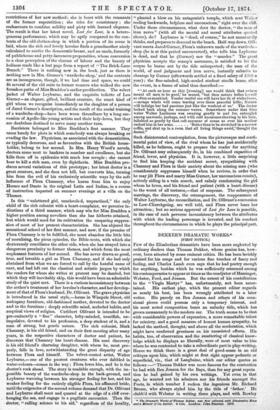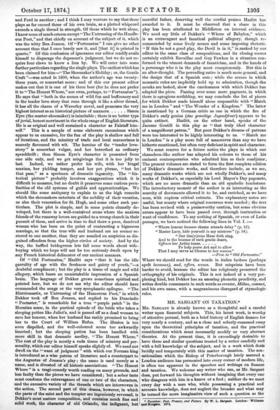DEKKER'S . DRAMATIC WORKS.* [FIRST NOTICE.] FEW of the Elizabethan dramatists
have been more neglected by ordinary readers than Thomas Dekker, whose genius has, how- ever, been attested by some eminent critics. He has been lavishly praised for his songs and for various fine touches of fancy and feeling, and Charles Lamb even says that he had poetry enough for anything, besides which he was sufficiently esteemed among his contemporaries to appear at times as the coadjutor of Massinger, Webster, Ford, and Jonson. But the extent of his contribution to the " Virgin Martyr " has, unfortunately, not been ascer- tained. His earliest play, which the present editor regards as nearly his best, has been wrongly attributed to a later writer. His parody on Ben Jonson and others of his occa- sional pieces could possess only a temporary interest, and his most noted composition bears an unlucky title, which has grown unmannerly to the modern ear. The truth seems to be that with considerable powers of expression, a more remarkable talent for mimicry, and a good measure of honest human sympathy, he lacked the method, thought,- and above all the moderation, which might have conferred greatness on his unassisted efforts. His habits, too, of observation and the smattering of classical know- ledge which he displays so liberally, were of most value to him where he was contented to take a subordinate part in play-writing. Hence we think there is a great deal of good-sense in an old critique upon him, which might at first sight appear pedantic or superficial, viz., that of Langbaine, which our editor quotes as follows :—" Thomas Dekker was more famous for the contention he had with Ben Jonson for the Bays, than for any great reputa tion he had gained by his own writings. Yet even in that age, he wanted not his admirers nor his friends amongst the Poets, in which number I reckon the ingenious Mr. Richard Brome, who always styled him by the title of father.' He clubb'd with Webster in writing three plays, and with Rowley The Dramatic Work.* of Thomas Dekker, now first collected, with Illastratire Notes and a Memoir of the Author. 4 vols. London: John Pearson. 1873. and Ford in another ; and I think I may venture to say that these plays as far exceed those of his own brain, as a platted whipcord exceeds a single thread in strength. Of those which he writ alone, I know none of much esteem except " The Untrussing of the Humiltr- ous Poet," and that chiefly on account of the subject of it, which was the witty Ben Jonson. Of "Fortunatus " I can give no other account than that I once barely saw it, and [that it] is printed in quarto." Of this confession of ignorance our editor readily avails himself to disparage the deponent's judgment, but we do not re- quire four claws to know a lion by. We will enter into some further particulars regarding the single plays. The earliest which has been claimed for him—"The Shoemaker's Holiday; or, the Gentle Craft "—was acted in 1600, when the author's age was twenty- three years, or somewhat more ; and of this our present editor makes out that it is one of his three best (for he does not prefer it to " The Honest Whore," nor even, perhaps, to " Fortunatus "). He says that "both in the scenes of wild fun and buffoonery and in the tender love.story that runs through it like a silver thread, it has all the charm of a Waverley novel, and possesses the very
highest interest as an historical picture of manners Simon Eyre (the master-shoemaker) is inimitable ; there is no better type of jovial, honest merriment in the whole range of English literature. He is as original and well sustained a character as Falstaff him- self." This is a sample of some elaborate encomiums which appear to us excessive, for the fun of the play is shallow and full of iterations, and the mimicry of trade and local mannerisms is scarcely flavoured with wit. The heroine of the "tender love- story" is somewhat vulgar, and her betrothed an ordinary spendthrift ; then Simon Eyre's character is presented from one side only, and we get misgivings that it is too jolly to last. Indeed, we rather prefer his wife, with her 'frugal maxims, her yielding temper, and her pet phrase, " but let that pass," as a specimen of dramatic ingenuity. The " his- torical picture " probably involves exaggerations which it is difficult to measure, but no doubt it preserves some curious pecu- liarities of the old systems of guilds and apprenticeships. We should like some antiquary to explain to us the high conceits which the shoemakers entertain of the nobility of their vocation, as also their veneration for St. Hugh, and some other such par- ticulars. The plot is simple, and in some points clumsily de- veloped, but there is a well-contrived scene where the anxious friends of the runaway lovers are guided to a wrong church in their pursuit of them, and arrive in time to find there a poor, deceived woman who has been on the point of contracting a bigamous marriage, so that the true wife and husband are no sooner re- stored to one another, than they are assailed on suspicion as dis- guised offenders from the higher circles of society. And by the way, the baffled bridegroom lets fall some words about wife- buying which we hope will not be too seriously dwelt upon by any French historical delineator of our ancient manners.
Of " Old Fortunatus," Hazlitt says " that it has the idle garrulity of age with the freshness and gaiety of youth,"—a doubtful compliment ; but the play is a tissue of magic and wild allegory, which bears an unmistakable impression of a Spanish. brain. The language of Dekker grows sometimes spirited and pointed here, but we do not see why the editor should have commended the songs or, the very sycophantic epilogue. "The Histriomastix, or Untrussing of the Humorous Poet," in which Dekker took off Ben Jonson, and replied to his Dunciadic 4' Poetaster," is remarkable for a true " purple patch " in the Horatian sense, in the poetical episode of the bride who takes a sleeping potion like Juliet's, and is passed off as a dead woman to save her honour, when her husband has rashly promised to bring her to the Court of William Rufus. The illusion is too soon dispelled, and the well-coloured scene too awkwardly inserted ; but the sleeping potion has been handled with more skill in that dramatic medley, " The Honest Whore." The rest of the play is mostly a rude tissue of mimicry and per- sonality, which our editor himself speaks slightly of. We need not dwell on the " want of judgment " with which our Norman king is introduced as a wise patron of literature and a counterpart to the Augustus of Jonson's play ; the name is used merely as a name, and is divested of all historic associations. " The Honest Whore " is a tragi-comedy worth reading on many grounds, and less faulty than the pieces we have considered ; but a sober taste must condemn the extravagance of one or two of the characters, and the excessive variety of the threads which are interwoven in the action. The second part of this drama, however, in which the parts of the saint and the tempter are ingeniously reversed, is Dekker's most mature composition, and contains much fine and solid work, the character of old Orlando, the indignant, but
merciful father, deserving well the cordial praises Hazlitt has awarded to it. It must be observed that a share in this play has been attributed to Middleton on internal evidence. We need say little of Dekker's " Whore of Babylon," which is an extravagant and fanatical political allegory, though re- commended by some lively scenes and some imposing rhetoric. " If this be not a good play, the Devil is in it," is ranked by our editor in the same class of compositions, and its closing scenes certainly exhibit Ravaillac and Guy Fawkes in a situation con- formed to the utmost demands of fanaticism, and in the hands of a personage who is in the play most conspicuously. But this is an after-thought. The pervading satire is much more general, and the design that of a Spanish auto; while the scenes in which monastic rules are implicitly held up to admiration, though the monks are lashed, show the carelessness with which Dekker has adapted the piece. Passing over some mere pageants, in which there is egregious scribbling, we may conclude the list of pieces for which Dekker made himself alone responsible with "Match me in London " and "The Wonder of a Kingdom." The latter is mentioned by. a German critic as one in which the fire of Dekker's early genius (des gewaltige Jugendfeuer) appears to be quite extinct. Hazlitt, on the other hand, speaks of the Jacomo Gentili in this play as " that truly ideal character of a magnificent patron." But poor Dekker's dreams of patrons were too interested to be highly interesting to us. " Match me in London " is a play more full of manceuvre than any we have hitherto mentioned, but often very deficient in spirit and character.
We must reserve for a future notice the plays in which our chameleon-hie author has adapted his colours to those of his eminent contemporaries who admitted him as their coadjutor. The present volumes are stated to form the first complete edition of Dekker's dramatic works, and therefore include, as we see, many dramatic works which are not wholly Dekker's, and many works of Dekker's, as especially his Lord Mayor's Day pageants, which are no more dramatic than an old symbolic tombstone The introductory memoir of the author is as interesting as the scarcity of documents allowed it to be, and enriched, as we have seen, with copious critical extracts. The explanatory notes are useful, but scanty where original resources were needed ; the text has been revised with a praiseworthy caution, but some obvious errors appear to have been passed over, through inattention or want of confidence. To say nothing of Spanish, 01' even of Latin passages, we have noticed the following lines in Vol. I. :—
"Where honour becomes shame attends delay " (p. 12). " Master Lacy, hide yourself in my mistress" (p. 54).
" Our tim(e)rous Muse doth sing, And to the bosome of each gentle dears,
Offence her Artles tunes
To help poore Art and to allow
That I may serve as Chorus to her scenes."
—Prot. to "Old Fortunatus."
Where we should read for the words in italics beckons (perhaps spelt beconnes), and, offers, scenes. But misprints have been harder to avoid, because the editor has religiously preserved the orthography of his originals. This is not indeed of a very per- plexing kind, but Dekker has an amusing phonetic proclivity, and writes double consonants in such words as orrator, Milian, commet, and his own name, with a magnanimous disregard of etymologic rules.



































 Previous page
Previous page